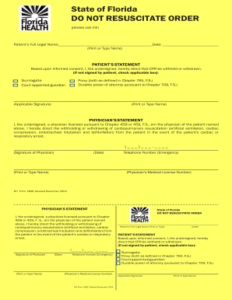
Confused about the differences between a Designation of Health Care Surrogate, Living Will, and a Do Not Resuscitate Order (DNR)? Here’s a quick explanation…
Living Will
Your Living Will (sometimes called a Declaration of a Desire for a Natural Death) informs your doctors that, if you’re terminally ill and/or in a vegetative state, and your doctors have said there’s no reasonable medical probability of recovery, you do not want extraordinary medical measures (CPR, ventilators, tube feeding, etc.) taken, especially those that would cause you pain or discomfort, if those measures would only prolong the dying process. In Florida, your Health Care Surrogate has a duty to enforce your Living Will. Anyone can deliver this document to your doctors if your Health Care Surrogate is unavailable.
Designation of Health Care Surrogate
Your Designation of Health Care Surrogate authorizes your Health Care Surrogate to make medical decisions for you if you cannot express your wishes or make the decisions yourself. It also allows your Health Care Surrogate to, among other things, hire and fire medical providers, and to obtain copies of your medical records.
Do Not Resuscitate Order (DNR)
A DNR is not prepared by a lawyer. It is a state-specific health care form that deals specifically with the refusal of cardiopulmonary resuscitation (CPR) in the event of cardiac or pulmonary arrest. It is a physician’s order, signed and dated by the patient (or Health Care Surrogate) and the physician.
A DNR is honored in most health care settings, including hospices, adult family care homes, assisted living facilities, emergency departments, nursing homes, home health agencies and in hospitals. In addition, when the DNR is presented to an emergency medical technician or paramedic in a setting other than a health care facility, the form may be honored.
Florida law requires that the form must be printed on yellow paper. The form is not valid unless it is printed on some shade of yellow paper. EMS providers and hospitals are not obligated to honor a form printed on white paper or any other color than yellow. The DNR form should be kept in a noticeable, easily accessible place such as the head or foot of a bed, or on the refrigerator.
Other articles you may find interesting:
9-Step Guide for a Personal Representative
Preparing for the Challenges of Aging
Would you like to learn more about estate planning, elder law, asset protection planning, probate, and Medicaid planning in an informal, no-obligation setting?
Sign up for one of our free, educational workshops here.








